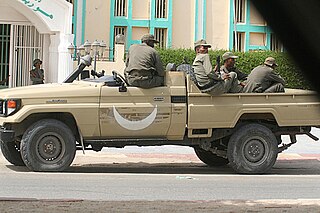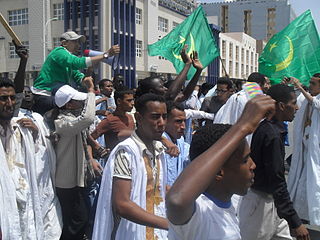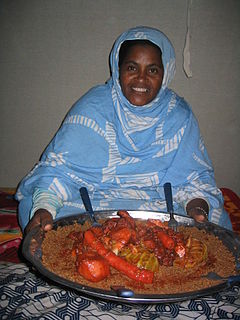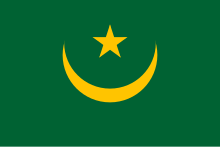This article is about the demographic features of the population of Mauritania, including population density, ethnicity, education level, health of the populace, economic status, religious affiliations and other aspects of the population.

The Armed Forces of Mauritania is the defence force of Mauritania, having an army, navy, air force, gendarmerie, and presidential guard. Other services include the national guard and national police, though they both are subordinated to the Ministry of the Interior. As of 2010, the Mauritanian armed forces budget was 5.5% of the country's GDP.

Nouakchott is the capital and largest city of Mauritania. It is one of the largest cities in the Sahel. The city also serves as the administrative and economic center of Mauritania.

Adrar is a large administrative region in Mauritania, named for the Adrar Plateau. The capital is Atar. Other major towns include Choum, Chinguetti and Ouadane. The region borders Western Sahara and the Mauritanian region of Tiris Zemmour to the north, Mali and the Mauritanian region of Hodh Ech Chargui to the east, the Mauritanian regions of Trarza and Tagant to the south and the Mauritanian region of Inchiri to the west.

The Mauritania national football team nicknamed Al-Murabitun in reference to Almoravid dynasty, represents Mauritania in men's international football and it's controlled by the Fédération de Football de la République Islamique de Mauritanie and is a member of the Confederation of African Football. They have not qualified for the FIFA World Cup. However, in the Amilcar Cabral Cup, a regional tournament for West Africa, Mauritania came fourth in 1980 on hosting the competition. The national football team of Mauritania were later runners-up in 1995, losing on penalties to Sierra Leone after the final finished 0–0. On 18 November 2018, Mauritania qualified to the 2019 Africa Cup of Nations for the first time in their history, after they won 2–1 against Botswana.

The foreign relations of The Islamic Republic of Mauritania have been dominated since independence by the issues of the Spanish Sahara as well as recognition of its independence by its neighbors, particularly Morocco. Mauritania's foreign relations are handled by the Minister for Foreign Affairs and Cooperation, and its current foreign minister is Ahmed Ould Teguedi.

Slavery has been called "deeply rooted" in the structure of the northwestern African country of Mauritania, and "closely tied" to the ethnic composition of the country.

Issues impacting Women in Mauritanian society include female genital mutilation, child marriage, and polygamy.

A coup d'état took place in Mauritania on August 6, 2008, when Mauritanian President Sidi Mohamed Ould Cheikh Abdallahi was ousted from power by a group of high-ranking generals he had dismissed from office earlier that day.

Mohamed Ould Abdel Aziz is a Mauritanian politician who was the 8th President of Mauritania, in office from 2009 to 2019. A career soldier and high-ranking officer, he was a leading figure in the August 2005 coup that deposed President Maaouya Ould Sid'Ahmed Taya, and in August 2008 he led another coup, which toppled President Sidi Ould Cheikh Abdallahi. Following the 2008 coup, Abdel Aziz became President of the High Council of State as part of what was described as a political transition leading to a new election. He resigned from that post in April 2009 in order to stand as a candidate in the July 2009 presidential election, which he won. He was sworn in on 5 August 2009.

Mauritania, officially the Islamic Republic of Mauritania, is a country in Northwest Africa. It is the eleventh largest sovereign state in Africa and is bordered by the Atlantic Ocean to the west, Western Sahara to the north and northwest, Algeria to the northeast, Mali to the east and southeast, and Senegal to the southwest.
Moulaye Ould Mohamed Laghdaf served as the Prime Minister of Mauritania from August 2008 until August 2014.

Human rights in Mauritania is generally seen as poor according to international observers, including Freedom House, the United States Department of State, and Amnesty International.

Leblouh is the practice of force-feeding girls from as young as five to nineteen, in countries where obesity was traditionally regarded as desirable. Especially prevalent in rural areas and having its roots in Tuareg tradition, leblouh is practiced to increase chances of marriage in a society where high body volume used to be a sign of wealth. The practice is being done in several African countries, such as Mauritania, Niger, Uganda, Morocco, Sudan, Tunesia, Nigeria, Kenya and South Africa. The synonym gavage comes from the French term for the force-feeding of geese to produce foie gras.

The 2011–12 Mauritanian protests are a series of protests in Mauritania that started in January 2011, concurrent with the Arab Spring, and continued into 2012. The largely peaceful protest movement has demanded President Mohamed Ould Abdel Aziz institute political, economic, and legal reforms. Common themes of protest have included slavery, which is officially illegal in Mauritania, but is widespread in the country, and other human rights abuses the opposition has accused the government of perpetrating.

Israel and Mauritania relations refers to the historic and current bilateral relationship between Israel and Mauritania. In 1999, Mauritania became the third member of the Arab League to recognize Israel as a sovereign state. The two countries established full diplomatic relations in October 1999. However, as a response to the Gaza War (2008–09), relations were frozen since 2009.

The cuisine of Mauritania includes the culinary practices of Mauritania. Historically, what is now Mauritania has been influenced by Arab and African peoples who have lived in and traversed the "stark" landscape marked with Sahara desert dunes in caravans. There is an overlap with Moroccan cuisine in the north and Senegalese cuisine in the south. French colonial influence has also played a role in influencing the cuisine of the relatively isolated land. Alcohol is prohibited in the Muslim faith and its sale is largely limited to hotels. Mint tea is widely consumed and poured from height to create foam. Traditionally, meals are eaten communally.

India–Mauritania relations refers to the international relations that exist between India and Mauritania.
The 2019–20 coronavirus pandemic was confirmed to have reached Mauritania in March 2020.















